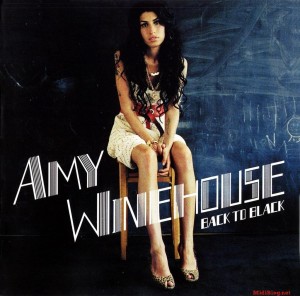ARTIST: AMY WINEHOUSE
ALBUM: BACK TO BLACK
“Life is funny and sad, sometimes both at the same time.” – Amy Winehouse
In less than a year UK singer Amy Winehouse has reemerged and reinvented herself from middling soul singer into one of the most notable and most sensational singers around the globe. Her gin-soaked bluesy vocals and don’t-give-a-f*ck street-attitude have perfectly set off the dark but seductive tones on her second album “Back To Black”, and as a result she’s established herself with a unique sense of style and attitude that has since been basking in the critical and commercial success that’s come her way. At the time of the initial release of “Back To Black” Amy Winehouse was just another singer, following up her debut album, without any air of real expectation; she’s now the centre of public attention and is the coolest name on the musical block to drop, when you’re talking about the best album releases of 2007.
Backtrack to late 2003, and Amy Winehouse had just released her debut album “Frank”’. The album was vaguely notable, showcasing an artist who was obviously inspired by jazz singers such as Ella Fitzgerald and Sarah Vaughan – especially when it came to her vocal phrasing, and who made passing references to modern-day urban music, with soul, jazz and reggae styles finding their way into the mix. Produced by Commissioner Gordan (Lauryn Hill), Matt Rowe (Spice Girls), Johnny Rockstar (Sugababes), Jimmy Hogarth (James Blunt), and Salaam Remi (Nas, The Fugees), the album was a slightly mundane collection of material that lacked personality, and featured bland cover artwork that added to the slightly forgettable nature of the project. Songs like “In My Bed” and “Take That Box” were flat songs that lacked an edge of excitement, although the singles “F*ck Me Pumps” and in particular “Stronger Than Me” were much better recordings – and in retrospect, are actually strong indicators of what Amy was to become. Nevertheless Amy made waves in the UK with the album which scored her optimistic comparisons to Macy Gray and Erykah Badu, and even won her an Ivor Novello Award for songwriting (for “Stronger Than Me”). All in all however, it’s not surprising that the “Frank” album had a limited reach – the songs weren’t particularly memorable, the production was soul/jazz-lite, and Amy’s X-factor was well and truly hidden.
Without the weight of expectation on her, Amy Winehouse went forward by working on material for her next album, concentrating her musical collaborations this time to just two producers, Salaam Remi and Mark Ronson (Busta Rhymes, Nikka Costa). Where exactly the script flipped is anyone’s guess, but if she lacked attitude beforehand, Amy was now ready to tell it like it was, no holds-barred. A broken relationship with Blake Fielder Civil (her now-husband) provided the emotional stimulation for the lyrical backdrop on her moody “Back To Back” album. Now tattooed, pierced, skinny-as-a-rake, drunk and sneering, Amy’s contemporary blues found a perfect home in amongst the soulful 60’s-like soul-pop of Mark Ronson’s shimmering, horn-fuelled productions, and Salaam Remi’s Lauryn Hill-like soul/hip hop sound, It was like a brand-new, quirky, groundbreaking fusion of The Ronettes and the Fugees. As producer, Mark Ronson is well aware that despite the exciting sound that he and Salaam Remi created, the music could never have been pulled off without the complete uniqueness of Amy Version 2.
“The amazing thing is that with Amy – who’s such a throwback, but is so modern in the way she looks and the things she sings about – is that I can really go to town with the music because at the end of the day, if she’s fronting it, we can get away with it. Whereas if she was a Macy Gray 30+ type of artist, it just becomes a bit pastiche and throwaway. So I’m kinda lucky to have Amy doing her own unique thing because then I can just go nuts with whatever I wanna do musically.”
Whilst the producers got creative with their sound, Amy penned lyrics that were heart-aching, straight-up honest, incisively-witty, and void of any artistic censorship. Amy Winehouse had never been as frank as she was on the songs from “Back To Black”, and no other artist was as ‘now’ as Amy was in her reference-points. At the cusp of the period that celebs were falling over themselves to check themselves into rehab centres around the globe in the hope of further publicity (Robbie, Lindsay etc), Amy’s wry and chant-worthy first single “Rehab” hit the airwaves and connected with audiences immediately, topping the UK charts. Nine months later the single continues to acquire audiences, this time setting alight charts in the US, where it reached the Billboard Top 10 recently, with the added addition of a Jay-Z rap (he’s just one of the superstars on the Amy bandwagon these days).
In an interesting twist, Lauryn Hill, who was a musical inspiration for Amy Winehouse, is herself these days sounding like she could learn a lot from Amy’s flow. Amy’s brutal honesty about herself, delivered in short-sharp observations with urban references, street-attitude and a soulful vibe is the kind of delivery that audiences are finding a real relationship with. It’s not surprising than Hill’s recent “Lose Myself” recording sounds like a sub-standard attempt at recreating the magic from Amy Winehouse’s “Back To Black” album. Regardless, Amy Winehouse is an artist who deserves to be recognized on her own merits. Having broken new ground, found a lyrical-honesty that’s a time-capsule and representation for how people feel and express themselves these days, there’s very few who can compare to Amy Winehouse. We can only hope that the paparazzi-styled spotlight invasion on her life won’t affect where she heads to as an artist in the future. “Back To Black” is classic album recording that will surely be referenced in the years ahead as a marker for our time – both musically, and as a cultural reference point for identity in 2007.
SASHA PERERA




